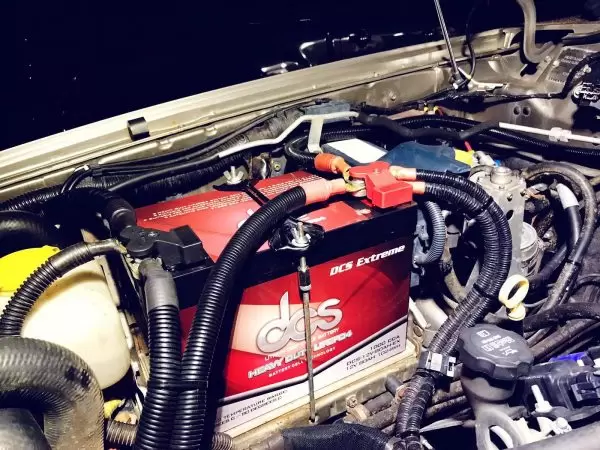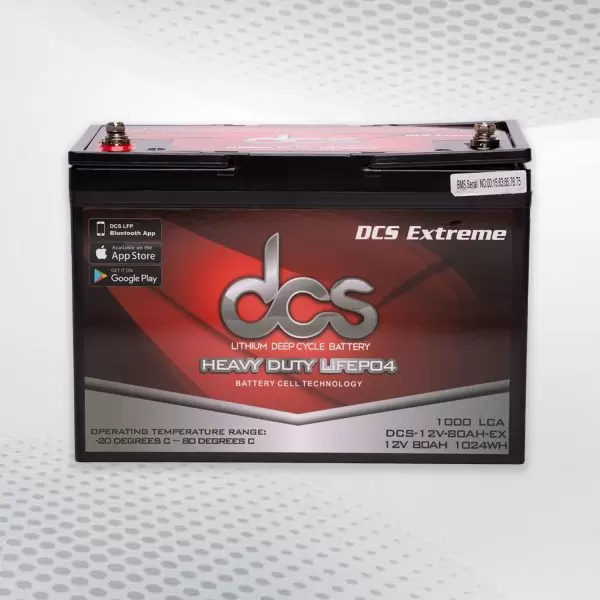When powering your vehicle, home, or RV, the battery is one of the most important components. An 80 amp hour battery is a reliable and powerful choice for many applications, but knowing what makes it the right fit is difficult. In this blog post, we’ll explore the key features of an 80 ampere hour battery that make it a powerful and efficient choice. From deep-cycle capacity to robust construction, we’ll uncover the power and potential of this type of battery.
Understanding Amp Hours
Before diving into the key features of an amp-hour battery, it’s important to understand what “amp hours” actually means. Simply put, an amp hour is a unit of measurement used to describe the capacity of a battery. It represents the amount of current a battery can deliver over one hour. For example, a battery rating of 80 amps hours can provide 80 amps of current for one hour or eight amps for 10 hours. It’s important to note that the actual amount of energy a battery can deliver depends on other factors, such as the voltage compatibility of the battery and the load being applied to it. However, the amp hour rating is useful for comparing batteries of the same type and size.
Amp Hour Rating
The Amp Hour Rating, also known as AH, is the most significant feature of a battery. It indicates how much current a battery can deliver for a specific duration. It is a critical feature for people who need to power their appliances, vehicles, or tools. Amp Hour Rating can help determine the battery’s runtime, lifespan, and overall capacity. For example, an 80 AH battery can provide 80 amperes of current for one hour or 1 ampere of current for 80 hours. It is important to remember that a battery’s AH rating may vary depending on the operating conditions. It may decrease if you use the battery under extreme temperatures, high loads, or overcharge the battery.
Battery Capacity
One of the key features of an amp-hour battery is its capacity, which is typically measured in ampere-hours (Ah). Battery capacity refers to the amount of energy the battery can store and supply to an electrical device over time. In simple terms, it is the amount of electricity that can be drawn from the battery before it needs to be recharged. When choosing a battery with an 80 amp hour capacity, it’s important to consider the intended use and power needs of the device or equipment that the battery will be powering. For example, an 80 Ah battery may be suitable for a small electric scooter but may need to provide more power for a large RV also important to note that battery capacity can be affected by various factors, such as the temperature and the discharge rate. For example, a battery with an 80 Ah capacity may only provide 70 Ah if discharged quickly.
Voltage Compatibility
Another important feature to consider when selecting an amp-hour battery is voltage compatibility. Different battery-powered devices have additional voltage requirements, so ensuring your battery has the appropriate voltage rating for your intended application is essential.For example, if you plan to power a device that requires 12 volts, you need a battery with a voltage rating of 12V or higher. It’s important to note that voltage rating differs from battery capacity, which measures the total energy the battery can store. When selecting an amp-hour battery, check the voltage compatibility of your device to ensure that it can provide the required voltage output. This will prevent the risk of damage to your device or battery failure.
Size and Weight
When choosing a battery, size and weight are crucial factors. The size and weight of an 80 ampere hour battery can vary depending on the technology used and the specific manufacturer. Generally, these batteries are designed to be compact and lightweight, making them easy to carry and install in various applications. One of the advantages of a smaller and lighter battery is its portability. If you need to move or transport your battery frequently, a compact and lightweight option will be more convenient and practical. The smaller battery takes up less space, allowing for more flexibility in terms of installation.
80ah Lithium Battery Has an Excellent Charge and Discharge Rate
The charge and discharge rate of an 80ah lithium battery is an important consideration for those looking to purchase this type of battery. Charge rate refers to the rate at which the battery can be charged, while discharge rate refers to the rate at which it can be discharged. For a battery with an 80 amp hour capacity, the charge rate is typically around 20 amps. This means it can be fully charged in around four hours, assuming that the charger is also rated for 20 amps. The discharge rate of an 80 ampere hour battery can vary depending on several factors, such as the load on the battery. However, as a general rule, these batteries can typically discharge at a rate of around five amps for about 15 hours before they need to be recharged. It is important to note that a battery’s charge and discharge rate can significantly impact its lifespan. If the battery is charged too quickly or discharged too fast, this can lead to premature failure and reduced performance over time.
Cycle Life
One important aspect of any battery is its cycle life. This refers to the number of charge and discharge cycles a battery can withstand before its performance starts to degrade. For an 80 ampere hour battery, the cycle life is typically 300-500 cycles. Factors affecting cycle life include the depth of discharge, charging rate, and operating temperature. For example, discharging a battery to a superficial level before recharging can significantly reduce its cycle life. Similarly, if a battery is charged too quickly or in sweltering conditions, it can shorten its lifespan.
When considering an 80 ampere hour battery for a particular application, it’s important to consider the expected usage and discharge rate. For example, a battery used in a backup power system that is rarely discharged may last longer than one used in a marine application that is cycled frequently.
Self-Discharge Rate
One of the key features of any battery is its self-discharge rate, which refers to the amount of power the battery loses over time when it is not in use. For an 80 ampere hour battery, the self-discharge rate will depend on various factors, such as the battery chemistry and temperature. A low self-discharge rate is always desirable because it ensures that the battery retains its power for as long as possible. If the self-discharge rate is high, the battery may lose its control in just a few days or weeks, even if it is not being used. This can be especially problematic if you need to rely on the battery during an emergency situation.
Charging Time
The charging time of an 80 ampere hour battery depends on the type of charger used, as well as the charge rate selected. A higher charge rate will shorten the charging time, while a lower charge rate will prolong it. Typically, a 10% charge rate is recommended for optimum battery health and safety. For example, using a 10 amp charger will take approximately 8 hours to fully charge an 80 ampere hour battery, while a 20 amp charger will halve the charging time to 4 hours. It is important to note that overcharging can damage the battery and decrease its overall lifespan, so it is crucial to monitor the charging process and disconnect the charger once the battery is fully charged.
Safety Features
When it comes to batteries, safety is of utmost importance. A high-quality 80 ampere hour battery will have several safety features to ensure the well-being of both the user and the battery itself. One important safety feature is overcharge protection. This feature prevents the battery from being overcharged, which can lead to overheating, swelling, or even explosion. Overcharge protection is essential for maintaining the battery’s lifespan and avoiding any potential accidents. Another key safety feature is short circuit protection. This feature prevents the battery from short-circuiting, which can also lead to overheating or explosion. Short circuit protection is critical when using the battery in devices or equipment that may have faulty wiring or electrical issues.
Environmental Impact
When it comes to batteries, their environmental impact cannot be ignored. While the key features of an 80 ampere hour battery offer many benefits, it’s also important to consider the impact of their manufacturing and disposal on the environment. One way to reduce the environmental impact of these batteries is to choose ones that use recyclable materials and have a longer lifespan. Longer-lasting batteries require fewer replacements, which ultimately means less waste in landfills. It’s also important to dispose of batteries responsibly. Many communities have designated recycling centers where old batteries can be disposed of properly, preventing them from leaching harmful chemicals into the environment.
Conclusions
The 80 ampere hour battery has proven to be a powerful and versatile energy storage solution. Its capacity and voltage compatibility make it a viable option for a variety of applications, from powering RVs and boats to running small appliances in off-grid settings. The battery’s charge and discharge rate and cycle life are also impressive, ensuring reliable performance over a long period of time. Additionally, its size and weight, while relatively heavy, are still manageable for most users. One notable aspect of the 80 ampere hour battery is its safety features, such as built-in protection against overcharging and overheating. Its low self-discharge rate also allows for extended periods of storage without losing significant charge. Of course, like any battery, the 80 ampere hour battery does have some drawbacks. Charging time can be a bit lengthy, and there are some environmental concerns around the disposal of certain battery types.
| Other Good Articles to Read |
| Niche Blogs Connect |
| Blogs 97 |
| Blog Stitution |
| Blogs Unplugged |
| Blogs Cotch Rouge |
| Blog Signatr |
| Blog Sintonias |
| Blog Zilla |
| Consumer Forums |
| G Blogs |
| Too Blog |



